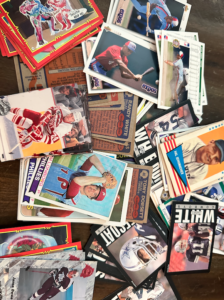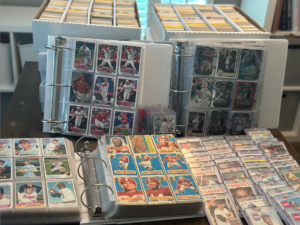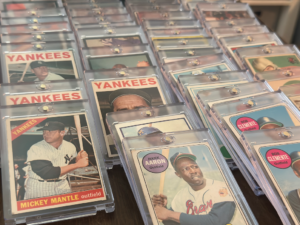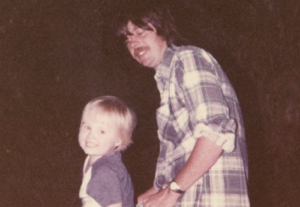Introduction:
In life, the most profound lessons often emerge when we least expect them. Sometimes, the journey of letting go and embracing change unravels insights that extend far beyond the immediate circumstances. For me, this was the case when I embarked on the emotional process of trying to sell my childhood baseball card collection. Little did I know that this introspective endeavor would parallel the intricacies of selling a business. In this story, I invite you to learn how my father’s collection of Mickey Mantle, and other, baseball cards illuminated the essential aspects of discovering something’s true value and what it really means, a concept every business owner should understand well before embarking on a process to sell their business.
Saying Goodbye and Finding Peace:
On February 15, 2016, my father’s long and difficult battle with cancer came to an end. While my family gathered in my childhood home in the days leading up to his passing, we were devastated and didn’t want to let go of him. My family’s feelings of fear, anxiety, sleeplessness, and even the occasional glimmer of hope gave way to deep sadness and grief. When the time came to say our final goodbyes, we were fortunate to be able to sit by his side, expressing our gratitude for him and how well he loved us. Over time, our moments of profound sadness transitioned to bittersweet moments of joy as we spoke of fond memories of him and laughter as we recounted funny stories. We ultimately felt a sense of peace – the peace that comes with knowing that our dear dad had met his heavenly Father. In the weeks that followed, I began to help my mom sort through my dad’s belongings and came across our baseball card collection, which had created an unforgettable bond between me and my father.
Dusty Boxes of Memories:
Knowing the sentimental value and the feelings of grief that these cards would bring up for me, I decided I wasn’t ready to look at them. But my mom entrusted me with the cards, so I brought the enormous collection home – literally tens of thousands of cards collected from my dad’s childhood and mine. I stored them away in the garage with the hope that, one day, I might be able to look back through our collection and share it with my own sons. Years passed and the boxes of cards, once a symbol of our shared passion for baseball, had gradually collected dust on a shelf in my garage. As I embarked on a new direction in my career earlier this year, I felt the need to get a fresh start and declutter. While cleaning out the garage, I realized that I was finally ready to revisit those neglected boxes. Suddenly, the prospect of selling the cards with the goal of funding savings accounts for my two boys, Hank (age 9) and Sam (age 7), sparked a fire in me. This seemingly straightforward decision uncovered a deep connection to my past and paved the way for valuable lessons about selling a business.
I moved the boxes inside and immersed myself in the task of unpacking and organizing the cards. Memories flooded back as I stumbled on hidden gems – iconic player cards like Mickey Mantle, Joe DiMaggio, and Roberto Clemente—sports heroes from my father’s era. I felt such excitement considering the potential payday I would see from selling the collection. I eagerly reached out to card dealers and collectors, sharing images of the stacks upon stacks of cards, hopefully anticipating substantial offers. To my surprise, the initial responses were disheartening, much below the value I was expecting. It became clear that I needed a new approach.

A Journey of Organizing and Discovering
Refusing to give up, I delved into research, seeking to understand the best strategies for selling collectable cards. I studied online listings that fetched premium prices, analyzing what made them so desirable to buyers. I sorted the cards by sport, organized them by team, year, and player and created a meticulously cataloged database. I took extra care to protect the most valuable cards, having them professionally graded and securely stored. The process was long, and time was of the essence since I aimed to complete the process by late spring so I could fully focus on my new career.


A Shared Experience:
The journey of organizing the collection was about to become a process of self-discovery. My once orderly office became a bustling workspace filled with nostalgia and anticipation. As I sorted the cards, I invited Hank and Sam to join me in the process. They eagerly participated, asking questions about the names of players and teams they had never heard before. We shared moments of excitement when they recognized a player or found a card they thought “looked cool.” During the process, they learned about organization, patience, research, and the power of discovering your own passions. I got to tell them more about their beloved Pop Pop and his life well-lived. I allowed them to keep handfuls of cards, always emphasizing the importance of safeguarding them and explaining the potential value they could hold. These moments of connection with my boys were reminiscent of the bond I had with my father – a true full-circle moment in my life.
Repositioning and Rediscovering Value:
As the cards became more organized, I revisited the idea of selling. Equipped with a well-cataloged collection, high-quality images, and newfound understanding of their value, I tested the market again. This time, the feedback was much more promising. It became evident that how I positioned the collection was crucial in attracting potential buyers. Unexpectedly, I had to reevaluate my desire to sell because I came to the realization that the sentimental value of our cards far outweighed a financial gain.
Now, conversations about collectible cards have become a regular occurrence in our house. Packs of NBA, NFL, and MLB cards slowly took the place of the boys’ weekly allowances. My sons enthusiastically (and loudly) share their latest discoveries. Hank, our die-hard Golden State Warriors fan, will exclaim “Dad! I found another Steph Curry card!” and ever loyal to his Mavs, Sam will announce, “I now have 11 Luka Doncic cards!” While witnessing their joy, I continue to work through my now organized collection, occasionally stumbling on a hidden gem, like the Mickey Mantle card I found hidden behind another card. The collection has become more than just cardboard tokens of athletic achievements – it represents over 70 years of father and son bonding, connecting three generations in a shared narrative. I often think back to the times I sat with a mouthful of stale Topps gum as my dad and I excitedly opened cards. I imagine my dad as a young boy sitting with his father doing the same. Our collection has a much greater value than I had previously understood; it’s building a legacy far beyond a financial gain.



(In order: My boys Sam and Hank; My dad and I; my dad with his sisters and father)
Lessons that Transcend Baseball Cards:
Selling a business, like selling a cherished collection, entails understanding the value that potential buyers will perceive. By failing to position my collection effectively, I unintentionally undersold its worth. Similarly, in the business realm, we must consider how others perceive the value of our enterprises. The five lessons listed below are a summary of the significant wisdom I gained during this experience.
1)Understanding the Power of Assessment
Simply put, a thorough and high-quality assessment of one’s business almost always pays off. Just as I invested time in sorting, organizing, researching, and cataloging my cards, business owners should take time to identify and understand all elements within their organizations, and how well they are performing. By doing so, they can not only begin to calibrate their business to the market, but also understand what elements are driving the greatest value, and which ones are detracting from it. This clarity will be important in how they position themselves in the market, and essential to ensure they are attracting the right type of buyer.
2) Knowing The Business Inside and Out
The assessment process also provides an opportunity to gain a deeper understanding of a business. While cataloging my cards, I sometimes stumbled upon collectibles that I had previously overlooked. Similarly, in the business world, it is vital to know every aspect of one’s organization, ensuring that no hidden gems are left undiscovered. Often, the most valuable assets are not found on financial documents, but instead they are embedded in the organizational culture, team capabilities, and the unique ways in which their business solves customer problems. These are the elements that buyers often offer premiums for, as they are transformative to future growth ambitions.
3) Reflecting Beyond Monetary Value
Just as my baseball cards held sentimental value beyond their monetary worth, a business encompasses more than a mere dollar figure. When selling a business we must recognize the hard work, memories, employee’s lives, and community impact embedded within it. Many businesses, under the surface, carry emotional stories of family heritage, of personal and professional growth, and a shared sense of accomplishment and pride. Considering the intangible aspects of the business help determine its true value and offer insights to the definition of a successful exit.
4) Gaining Clarity About What’s Important
Clarity on what we have and what we value illuminates our options. The meticulous cataloging of my cards coupled with the emotional attachment to the collection helped me recognize what I genuinely valued. In the realm of selling a business, having clarity about personal and stakeholder goals allows for informed decision-making during the transition process. All too often owners will realize too late in the process the anxiety and fear that comes along with realizing that they may be selling to the wrong buyer. For many owners, they discover that who they sell the business to is every bit as important as what they sell it for.
5) Avoiding Regret
Rushing the process can often lead to regret. Had I hastily sold my baseball cards at a discounted price, or even just put them back in the garage, I would have missed out on the profound experience that unfolded. Similarly, selling a business requires thoughtful deliberation to avoid potential regrets. An owner that has clarity on what they truly have, and what they genuinely want, results in a peaceful confidence that makes the M&A process less intimidating and more rewarding. One thing that I think we can all agree on is that a life lived without regrets is a life well-lived.
Conclusion:
The journey from organizing my baseball cards to discovering how to best position a business for sale has been a transformative one, full of unexpected connections and valuable life lessons. My passion for assisting business owners in discovering their business’s hidden value grows stronger by the day. Engaging with passionate entrepreneurs, learning their stories, and discussing future options brings me immense joy and fulfillment.
Whether you choose to seek guidance from me or my fellow advisors at Agora Strategic Consulting or not, I encourage you to approach selling your business as more than a simple transaction. By adopting the perspective of a prospective buyer and taking the time to assess your business, clarify your values and desires, and make decisions with confidence, you will not only likely achieve the maximum monetary value – you can also ensure the transition will leave you fulfilled and free of regret.

